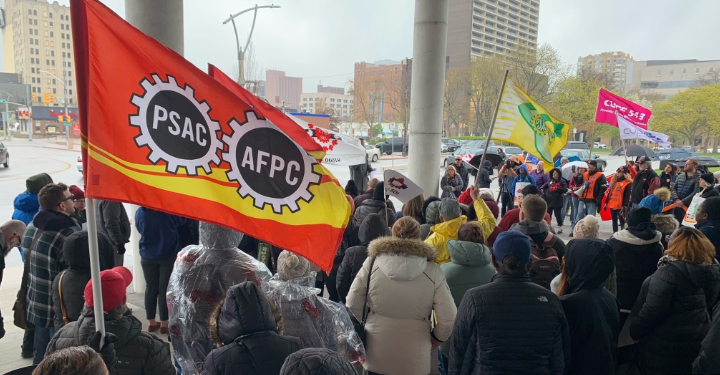The largest public sector union in Canada and the government have reached a tentative agreement to terminate one of the country’s largest strikes in history.
After nearly two weeks, the agreement between the Treasury Board and four PSAC bargaining parties representing 120,000 public servants ends the strike. Monday at 9:00 a.m., union members returned to work.
Chris Aylward, the national president of PSAC, said in a Monday news release, “PSAC members held the line and secured a fair contract that keeps up with the cost of living, increases protections around remote work, and creates safer, more inclusive workplaces.”
Mona Fortier, president of the Treasury Board, stated that the agreements were the result of weeks of “hard work, negotiation, and compromise.”
“We are extremely appreciative of public servants who tirelessly serve Canadians across the country and look forward to welcoming them back,” she said. These agreements are equitable, competitive, and reasonable, and they provide public servants and Canadians with stability.
The contract is retroactive until June 2021 and is in effect until June 2024. Union members must still deliberate on it.
According to both parties, the tentative agreement consists of the following.
ON WHAT SALARY INCREASE DID THE PARTIES AGREE?
According to the union, the agreement includes a compounded wage increase of 12.6% over four years, which closes the wage disparity with inflation.
The Treasury Board presents the increase in a distinct manner. The government estimates that the wage increase will be 11,5% over four years, with a group-specific allowance of 0.5% in the third year.
In addition, the agreement stipulates a one-time flat sum payment of $2,500 for each employee.
According to the union, for workers nearing retirement, this payment will contribute to their average salary for their five years of service and enhance pension payments.
The PSAC entered into negotiations seeking a 13,5% wage increase over three years. The initial offer from the government was nine percent over the same time period.
WHAT ABOUT WORK FROM HOME?
According to the government, two parties reached an agreement on working from home outside of the collective agreement.
“The Government of Canada remains committed to a modern, hybrid workplace that allows employees, where applicable, to continue working up to three days per week from home. We reached a provisional agreement on telework outside of the collective bargaining agreements that satisfied both parties. We agreed to conduct an assessment of the Telework Directive and to establish departmental panels to advise deputy heads on employee issues.”
PSAC asserts that its members now have access to additional protection against arbitrary remote work decisions.
“We have also negotiated language in a letter of agreement that requires managers to evaluate requests for remote work individually, not as a group, and to provide written responses that will allow members and PSAC to hold the employer accountable for equitable and fair remote work decision-making.”
The parties have also agreed to establish joint committees to address employee concerns regarding remote work.
WHAT ELSE DOES THE AGREEMENT CONTAIN?
PSAC asserts that it also secured protections against outsourcing in the federal public sector.
“PSAC has negotiated language to ensure that, in the event of layoffs, PSAC members will not lose their jobs if they can perform the duties of a contractor already working with the federal government,” the union explains.
PSAC negotiators also emphasised anti-racism training as a critical issue. Monday, the union announced that the agreement includes “an agreement to create a joint committee to review the existing training courses related to employment equity, diversity, and inclusion and to ensure that employees are aware of all available training opportunities during work hours.”
Additionally, the agreement includes paid leave for Indigenous employees to engage in traditional activities such as trapping and fishing.
WHAT ABOUT CRA WORKERS?
Despite the fact that tentative agreements have been reached with four bargaining units representing 120,000 employees in the core public service, 35,000 CRA employees remain on strike.
These employees are represented by PSAC’s Union of Taxation Employees.
Monday, PSAC announced in a press release that the PSAC/UTE bargaining team would engage in a “blitz of negotiations” with CRA in an attempt to reach an agreement.
Monday morning in Ottawa, CRA employees were out picketing, including on Heron Road.














































